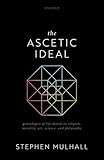The ascetic ideal : genealogies of life-denial in religion, morality, art, science, and philosophy / Stephen Mulhall.
Material type: TextPublisher: Oxford, United Kingdom ; New York, NY : Oxford University Press, 2021Copyright date: ©2021Edition: First editionDescription: vi, 305 pages ; 24 cmContent type:
TextPublisher: Oxford, United Kingdom ; New York, NY : Oxford University Press, 2021Copyright date: ©2021Edition: First editionDescription: vi, 305 pages ; 24 cmContent type: - text
- unmediated
- volume
- 9780192896889
- 0192896881
- Nietzsche, Friedrich Wilhelm, 1844-1900 -- Criticism and interpretation
- Nietzsche, Friedrich Wilhelm, 1844-1900. Zur Genealogie der Moral
- Nietzsche, Friedrich Wilhelm, 1844-1900
- Zur Genealogie der Moral (Nietzsche, Friedrich Wilhelm)
- Asceticism -- History
- Asceticism -- Christianity
- Civilization, Western
- Ascétisme -- Histoire
- Ascétisme -- Christianisme
- Civilisation occidentale
- Asceticism
- Asceticism -- Christianity
- Civilization, Western
- 204.4709 23
- BJ1491 .M85 2021
| Item type | Current library | Shelving location | Call number | Copy number | Status | Date due | Barcode | |
|---|---|---|---|---|---|---|---|---|
 Books
Books
|
CamTech Library | General Collections | 204.4709 MUL (Browse shelf(Opens below)) | C.1 | Available | CamTech 000614 |
Browsing CamTech Library shelves, Shelving location: General Collections Close shelf browser (Hides shelf browser)
Includes bibliographical references (pages 299-302) and index.
Essay One: Authority and Revelation -- Essay Two: Writing the Life of the Mind -- Essay Three: Knowing, Framing, and Enframing.
"In The Ascetic Ideal, Stephen Mulhall shows how areas of cultural life that seem to be either essentially unconnected to evaluative commitments (science and philosophy) or to involve non-moral values (aesthetics) are in fact deeply informed by ethico-religious commitments, for better and for worse. The book develops a reading of Nietzsche's concept of 'the ascetic ideal', which he used to track the evolution, mutation, and expansion of the system of slave moral values, associated primarily with Judaeo-Christian religious belief through diverse fields of Western European culture--not just religion and morality, but aesthetics, science, and philosophy. Mulhall also offers an interpretation of Nietzsche's genealogical method that aims to rebut standard criticisms of its nature, and to emphasize its potential for enhancing philosophical understanding more generally. The focus throughout is on developments in those fields which occurred after the end of Nietzsche's intellectual career, and in particular on influential modes of thought and practice that have a contemporary significance. The goal is not simply to argue that Nietzsche's diagnosis and critique retains considerable merit, but also to show that Nietzsche is himself significantly indebted to the ideals he criticizes, and that this opens up a possibility of synthesizing elements of his approach with those drawn from its target. Hence, the book also tracks various ways in which the object of Nietzsche's criticism has undergone further mutations (just as his genealogical method would suggest), and in doing so has generated ways of pursuing the values central to asceticism that avoid Nietzsche's criticisms, and might even further his own goals."--Publisher's description.
There are no comments on this title.







